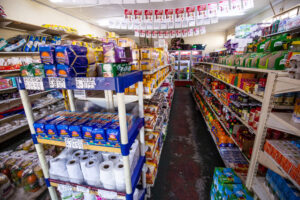An assessment of South Africa’s food system, which identified core challenges and proposed potential policy levers to address these, was recently published by the European Union (EU), Food and Agricultural Organization of the United Nations (FAO), and the French Agricultural Research Centre for International Development (CIRAD).

Photo Ashraf Hendricks.
The assessment was conducted by the DSI-NRF Centre of Excellence in Food Security (CoE-FS), hosted by the University of the Western Cape and co-hosted by the University of Pretoria, on behalf of the EU, FAO, and CIRAD.
Food systems profile – South Africa. Catalysing the sustainable and inclusive transformation of food systems, is the result of a systemic analysis and stakeholders’ consultation that was part of a global assessment of food systems in over 50 countries. In South Africa, the CoE-FS hosted four meetings (Food Imbizo) in October 2021, with participants that included members of civil society organisations, the private sector, representatives from the South African government, and food researchers from different disciplines.
The assessment provides a summary of the main food system issues in the country, and highlights potential solutions for their sustainable and inclusive transformation, known as policy levers.
- Professor Julian May.
- Professor Bruno Losch.
“The assessment draws together studies undertaken by South African and international researchers, applying a policy lens to identify challenges and opportunities for the food system,” said Professor Bruno Losch, who co-led the assessment and is a CoE-FS programme investigator.
Professor Julian May, co-lead on the assessment and director of the CoE-FS, added: “This is an opportune moment for such analysis as policymakers, producers, retailers and consumers grapple with the impact of climate change and volatile food prices.”
Key messages*
The South African food system is characterised by a paradox. The country is in the upper-middle-income group, has the second-largest GDP value, and is the most industrialised in Africa. Home to 60 million people (the fifth most populous country on the continent), South Africa has a positive food balance, supported by sophisticated food, nutrition, and agricultural policies and many programmes. However, food system outcomes are sobering and do not reflect the country’s position.
The food system remains shaped by inequities rooted in colonialism and exacerbated by apartheid policies and the concurrent isolation of the country. This history, together with reintegration into the global food economy and the adoption of deregulation policies, have contributed to the following:
- persistence of food and nutrition insecurity despite the availability of sufficient food and public health interventions;
- degradation of an already vulnerable natural environment aggravated by the early adoption of conventional agriculture techniques and, more recently, by climate change;
- continuation of extreme wealth and income inequality arising from multidimensional poverty and unemployment shaped by former racial policies; and
- growing asymmetries in power, efficiencies, and information between stakeholders across food value chains and spheres of governance.
Four core challenges have been identified for the country to transition toward a sustainable food system: improved nutrition; sustainable agricultural production systems; levelling the food system playing field, and improved food system governance.
To address these challenges, policy levers include the following:
- in the area of food insecurity and nutrition: reduce the cost of nutrition-dense food and increase the range, scale, and coverage of child-centred food system interventions in the built environment;
- in the area of food production: support the transition towards agroecological food systems, and link land reform with place-based farmer support;
- in the area of market functioning: reform and enforce food system regulatory policies, adopt an integrated approach to building an inclusive food system; and
- in the area of food system governance: improve inclusive stakeholder participation and enhanced engagement, and adopt a two-pronged place- and issue-based approach to food system governance.
The full assessment is available for download here.
*FAO, European Union, CIRAD and DSI-NRF Centre of Excellence in Food Security (CoE-FS). 2022. Food Systems Profile – South Africa. Catalysing the sustainable and inclusive transformation of food systems. Rome, Brussels, Montpellier, France and Bellville, South Africa. https://doi.org/10.4060/cc0071en.
related Articles
How to use the law against the law, for better systems
At the recent Food Indaba “Hunger and Power” conference, activists, analysts and academics explored ways in which to use the…
Hunger as a weapon: in war and at home
Displaced women making bread during the humanitarian pause in Khan Younis. UNRWA photo by Ashraf Amra. From Gaza and Ethiopia,…





